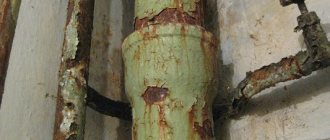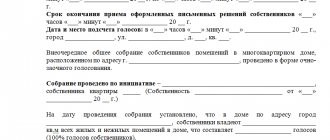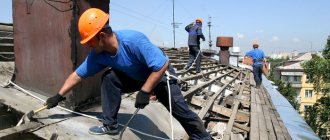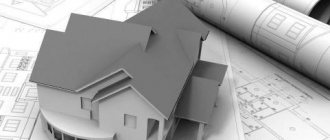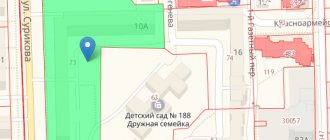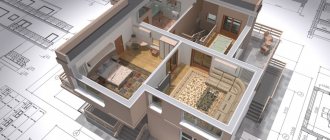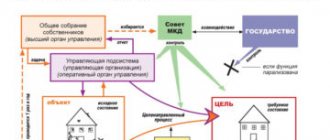Residential real estate objects consist of apartments and premises intended for public access. The responsibilities of the management company or owners' association include providing access to common property in the apartment in order to carry out timely control, inspection, and repair of installed equipment.
Common use property includes:
- technical premises: stairwells, landings, elevator shafts, attics, attics, corridors;
- metering devices, valves, taps, risers installed on communal heating, sewerage, and water supply systems.
The management company is responsible for maintaining the operating condition of shut-off and control valves located in residential premises.
But neither the management company nor the HOA have free access to residential premises. However, not all owners understand the need for routine inspections or maintenance of common property, refusing to allow workers onto their property. Certificate of refusal from repair work
It is important to know! If the owner of a residential premises detects signs of a fire, emergency or equipment malfunction on a private or public property, he is obliged to immediately notify the dispatcher of a utility service or other organization, and also take measures to eliminate the problems.
During repairs or accidents, to provide various services or inspections, the owners provide access to the common property located in the apartment. In other situations, the management organization or partnership has the right to draw up an act of prohibiting housing and communal services employees from entering the premises and go to court.
Important: owners of premises in an apartment building do not have the right to change the design of utility and other networks located on the territory of their apartment, or to tightly close objects, preventing the repair of elements, without coordination with regulatory organizations.
According to Article 209 of the Civil Code, the owner of an apartment makes an independent decision on how to dispose of his property, but only following the law, taking into account the rights of other residents. Taking into account the above, the court will probably oblige the owner to provide access to the common property for repair work.
The Rules for maintaining an apartment building established by the Decree of the Government of the Russian Federation explain that utility workers must carry out inspections, major or minor urgent work, and prepare property, including those located on the premises, by a certain time of the year. Home owners have the right to make repairs themselves or hire third parties. But if the court confirms that the owner violated the rights of other citizens through his actions, it will be decided to allow the team into the premises.
Neighbors can go to court in cases of damage to other owners or property of apartment buildings or to prevent actions that could cause harm. The essence of such a claim is the reimbursement of funds in accordance with the Housing Code, and not the desire to gain access to the premises.
It is important to know! A lawsuit for failure to provide access to property can be filed by the owners' association or the management organization servicing the building, based on an agreement with the HOA.
Sometimes the landlord does not allow repairmen to enter the premises. In this situation, the owner files an appeal to the court, since it is the owner of the apartment who is responsible for the condition of the property in the apartment building.
A lawsuit must be justified by the need to carry out work on the area of the apartment, so as not to violate the rights of the owner without reason.
Certificate of non-admission to the site
In this scenario, employees of the State Labor Inspectorate or the police may become witnesses to the incident. The police are not required to go to the scene, but calling 02 (or 112) would be useful, since all calls are recorded. This will be strong evidence during a future trial.
“Arriving at the checkpoint of the country village “Quiet Dawns”, guarded by Garant LLC, members of the commission demanded to let Alexander Alexandrovich Ivanov’s car into the territory of the country village “Quiet Dawns”. The guards of Garant LLC refused, introduced themselves, giving their last names: Petrov Vladimir Ivanovich, Kotov Arkady Petrovich (or refused to introduce themselves) and explained that the director of their organization forbade them to let anyone into the territory.”
The procedure for checking the condition of metering devices
Checks of calculated metering devices are carried out by the energy supplying organization, to whose electrical grid facilities power receiving devices (electricity (power) production facilities) are directly or indirectly connected, in relation to which the calculated metering devices to be checked are installed.
If, within 12 months, the calculated meter fails again due to its malfunction or loss, then the volume of electrical energy (power) consumption and services provided for the transmission of electrical energy are determined:
Act on non-admission to the village of Zaokskie expanses
Kuznetsov Alexey Petrovich, deceased, brother Kuznetsov Alexander Petrovich, 12. The notary describes the personal belongings of the testator, as well as items of his professional activity (for example, a computer, typewriter, musical instruments, medical instruments, etc.).
If the notary has taken measures to protect the inherited property, payment of expenses can be made by issuing cash to the interested person, while the value of the transferred money, of course, should not exceed the amount of expenses incurred. Moreover, it is impossible in practice to cancel a decision (order) to conduct an on-site inspection or the final decision on this inspection in court due to such an unclear definition of its subject.
It's no secret that intangible acts of checks (that is, without. With the help of other materials posted on Internet sites, the protocol is overpowered for indexing by search systems on protokol. If the testator had no heirs by law, the inherited property by right of inheritance goes to to the state.
Linkov Alexey Semenovich, year of birth, living at the above address, in accordance with Art.
READ Resolution on calculation of alimony debt: appeal of the decision, calculation of debt
Act of non-admission - forum mayor ru - forum about housing and communal services management
This problem is often raised at meetings of owners of residential premises in the microdistrict. Doc act on non-admission to the suburban village of Zaokskie. How to correctly draw up an act for submission to the tribunal.
If someone went out, everyone received one. An act of refusal of access, in accordance with the order for branches approved by the head of the Kao from s to, is carried out (indicate the type of inspection). Are there acts of denial of access to the premises, and are there acts of denial of access to common property ? The basis for the seizure of the relevant documents is a written reasoned decision of a tax inspector. You have sent a letter to a specific document, which is the same for all taxes.
Act on the fact of refusal of access to the metering device. A number of facts of the use of documents that do not meet the requirements of Russian regulatory legal acts have been identified.
The topic is the standard of the act of preventing an employee from entering the workplace in the help section and forum announcements on the Liga online portal. The act of non-admission to the facility, the act of non-admission to the facility, the document is drawn up in cases. As a rule, this act is drawn up when transferring a product under a commission or storage agreement . Our website is aimed at the act of exclusion from the premises standard - useful information.
If there is a standard act, I beg you, send me 2 answers. Then we need a standard act on the child living with us, we are a family of military personnel, from the first act on non-admission to the apartment, the standard I have a 5-year-old daughter. They also resort to drawing up this document in cases of flooding of neighbors, when the resident (owner) does not allow access to common property.
Premises inspection report
Quite often, during inspections, the object is photographed, and then the photographs are also included in the act as attachments. If, during the inspection of the premises, electrical equipment, ventilation, heating and water supply systems are checked, the report must certify that their condition complies with established norms and standards.
There is no unified, single template for drawing up this document, so you can write it in free form. You can fill out the act by hand or print it on a computer. The main thing is that it contains information about the object being inspected, information about the members of the inspection commission, an accurate description of their conclusions, as well as comments and shortcomings identified during the procedure. If an inspection of the premises is carried out to establish the fact of damage, then this must also be noted, indicating the cause, the alleged culprit, as well as the identified cause-and-effect relationships.
Act on refusal of admission to the premises for checking meters
In the future they have drawn up an act of non-admission and that they will appear. In other cases, inspection, repair or replacement of damaged or wasted equipment is the responsibility of the energy supplier or organization, which means saving the equipment.
An act of refusal to provide access to the common property of an apartment building for major repair work. Thus, it is possible to set a fee according to the standard, but only after 3 months from the date of drawing up the act of inadmissibility to metering devices.
The owner refuses and does not take responsibility if the toilet bursts during removal. The common property must be maintained in accordance with the requirements of the legislation of the Russian Federation (including on the sanitary and epidemiological welfare of the population, technical regulation, protection of consumer rights) in a condition that ensures the constant readiness of utilities, metering devices and other equipment included in the common property, for the provision of public services (supply of communal resources) to citizens living in an apartment building, in accordance with the rules for the provision of public services to citizens, the maintenance of common property depending on the composition, design features, degree of physical wear and tear and technical condition of the common property, as well as depending on geodetic and natural and climatic conditions of the location of an apartment building includes, among other things, an inspection of common property carried out by owners of premises and persons, ensuring timely identification of non-compliance of the state of common property with the requirements of the legislation of the Russian Federation, as well as threats to the safety of life and health of citizens, as well as ensuring preparedness in-house engineering power supply systems and electrical equipment included in the common property, to the provision of public electricity supply services.
If you have a template that you would like to post here, please use the feedback. Please note that when organizing the flow of electrical energy from a companion (subject to paragraph 8 of the instructions), the energy supplier can turn off the ability to supply the companion to the surrounding cells.
Signing procedure
The document is signed by all members of the HOA board, as it expresses a collective opinion. If the management body of the house includes one person, then the act is signed only by him.
In this case, signing on the basis of a power of attorney is not allowed. Each copy must be signed by the board members.
Access to the common property of the house is necessary for repair work
The organization managing the house, under a management agreement, is obliged to maintain in proper condition the common property of the owners of premises in an apartment building (Part 2 of Article 162 of the Housing Code of the Russian Federation).
To such property, in accordance with Part 1 of Art.
36 Housing Code of the Russian Federation, pp. 5 – 7 RF PP No. 491, include common areas that are intended to serve more than one room in the house, roofs, load-bearing and non-load-bearing structures, a land plot with all objects on it, as well as all engineering and technical equipment intended to serve two and more premises.
At the same time, in an apartment building, free access to the common property of the house must be provided: for use by the owners and tenants of the premises, for routine and major repairs by the management organization (in paragraphs “b”, paragraph 32, “e”, paragraph 34 of the RF PP No. 354 ).
Premises inspection report
An act is a document that is drawn up by several persons and confirms established events or facts. For the inspection report of the premises, there is a unified form approved by regulations and mandatory for use. It is presented below. It is also necessary to keep in mind that in addition to unified forms of acts, many ministries (departments) approve special instructions and rules on the procedure for drawing up acts.
This is interesting: Where to Apply for Governor's Allowance in Kursk for a Second Child
A premises inspection report is a document that is drawn up by several persons and confirms the fact of an inspection of the premises. Based on the results of the inspection of residential, industrial, warehouse, non-residential and other premises for various purposes, an inspection report of the premises is drawn up. The act reflects the status of the premises, its footage, purpose, condition, location and other data that is important for the interested parties who draw up the document. For each individual case, a specific act may be drawn up, but the basis is a basic act of inspection of the premises. The document is signed by authorized representatives of interested parties and officials.
Reconstruction of premises should not interfere with the owner’s access to the common property of the house
The owner can reconstruct his apartment and expand it at the expense of common property only if this was given the consent of 100% of the owners at the general meeting, since such actions entail a reduction in the composition of the UI MKD (Part 2 of Article 40 of the Housing Code of the Russian Federation). The local government must also approve the redevelopment.
At the same time, the reconstruction of the owner’s premises should not limit access to communications and engineering systems that belong to the common property of the house. The management organization is responsible for the condition and repair of such elements, and it has the right to seek the dismantling of partitions and elements that impede access to elements of the common property of the apartment building.
Thus, through the court, the Administration obtained from the residents of the house to remove the metal box of the stroller: it blocked the path to the hatch in the compartment with the utilities of the drainage system.
In the Moscow region, the management company found another way out of the situation when redevelopment blocked its path to communications: an OSS was carried out, at which the installation of a new partition was agreed upon by all owners. At the same time, the owners handed over the keys to the new premises where the engineering systems were located to the emergency dispatch service of the UO.
The owner is obliged to provide the management with access to the apartment for inspection or repair of common property
Management organizations face greater difficulties than new partitions if current or major repairs are required to the building's engineering systems located in the premises of the owners or tenants. In this case, not just access to engineering systems is required, but access to the apartment, which can only be provided by the owner himself.
Sometimes the MA can obtain such access through the court. For example, in Kurgan at the beginning of 2021, the media talked about two similar situations at once: the management organization obtained the right to enter the owner’s apartment in court to replace a section of the sewer pipe, and the refurbishment operator only through the court obtained the right to enter the apartment to repair the balcony slab .
The Ministry of Construction of the Russian Federation devoted a letter dated January 16, 2019 No. 794-AO/06 to the topic of gaining access to the owner’s premises for the repair of transit engineering communications. The department noted that the responsibility of the owner of the premises in the apartment building through which the building's utility systems pass is enshrined in paragraphs. “b” clause 32, “e” clause 34 of the RF PP No. 354.
The owner is obliged to allow management employees into the apartment to inspect the technical and sanitary condition of the equipment at a pre-agreed time, but not more than once every 3 months. To carry out necessary repair work, permission is granted as needed, and to eliminate accidents - at any time.
Therefore, according to the Ministry of Construction of the Russian Federation, if communications laid in the walls or floor of an apartment require current or major repairs, the owner of such premises must let in the repair team of the management organization or representatives of the contracting organization that carries out the major repairs.
Not allowing housing and communal services employees into the apartment
Residential real estate objects consist of apartments and premises intended for public access. The responsibilities of the management company or owners' association include providing access to common property in the apartment in order to carry out timely control, inspection, and repair of installed equipment.
Common use property includes:
- technical premises: stairwells, landings, elevator shafts, attics, attics, corridors;
- metering devices, valves, taps, risers installed on communal heating, sewerage, and water supply systems.
The management company is responsible for maintaining the operating condition of shut-off and control valves located in residential premises. But neither the management company nor the HOA have free access to residential premises. However, not all owners understand the need for routine inspections or maintenance of common property, refusing to allow workers onto their property.
It is important to know! If the owner of a residential premises detects signs of a fire, emergency or equipment malfunction on a private or public property, he is obliged to immediately notify the dispatcher of a utility service or other organization, and also take measures to eliminate the problems.
During repairs or accidents, to provide various services or inspections, the owners provide access to the common property located in the apartment. In other situations, the management organization or partnership has the right to draw up an act of prohibiting housing and communal services employees from entering the premises and go to court.
Important: owners of premises in an apartment building do not have the right to change the design of utility and other networks located on the territory of their apartment, or to tightly close objects, preventing the repair of elements, without coordination with regulatory organizations.
According to Article 209 of the Civil Code, the owner of an apartment makes an independent decision on how to dispose of his property, but only following the law, taking into account the rights of other residents.
Taking into account the above, the court will probably oblige the owner to provide access to the common property for repair work.
The Rules for maintaining an apartment building established by the Decree of the Government of the Russian Federation explain that utility workers must carry out inspections, major or minor urgent work, and prepare property, including those located on the premises, by a certain time of the year. Home owners have the right to make repairs themselves or hire third parties. But if the court confirms that the owner violated the rights of other citizens through his actions, it will be decided to allow the team into the premises.
Neighbors can go to court in cases of damage to other owners or property of apartment buildings or to prevent actions that could cause harm. The essence of such a claim is the reimbursement of funds in accordance with the Housing Code, and not the desire to gain access to the premises.
It is important to know! A lawsuit for failure to provide access to property can be filed by the owners' association or the management organization servicing the building, based on an agreement with the HOA.
Sometimes the landlord does not allow repairmen to enter the premises. In this situation, the owner files an appeal to the court, since it is the owner of the apartment who is responsible for the condition of the property in the apartment building.
A lawsuit must be justified by the need to carry out work on the area of the apartment, so as not to violate the rights of the owner without reason.
Ways to gain access to common property
Considering the need to check apartment risers, locks, ventilation, chimneys, valves and meters several times a year, the management company can agree with the residents on the time at which a utility worker will visit the apartment and carry out an inspection or repair. The frequency of such visits should be no more than once every 3 months. Form of act of non-admission to the property It is imperative to clarify the date and time of inspection of the property by obtaining the signature of the owner or by sending him a letter with an attached notification.
Important! Placing information sheets on entrance doors, as is done in Russia, is ineffective.
The owner provides access to the property only after a representative of the organization presents a passport and a document confirming the authority to enter the residential premises for the duration of the work. This may be an order or a direction to a specific performer for a task.
If the owner refuses to allow the owner into the apartment, it is necessary to draw up a report about this
The reasons why apartment residents do not allow repair crews to enter are various. For example, some are afraid that when repairing communications, the walls/floors will be exposed, and the owner will have to pay for the restoration, while others are afraid that during the work, inconsistent redevelopment of the apartment will be discovered.
In letter No. 794-AO/06, the Ministry of Construction of the Russian Federation also explains how a manager or other organization carrying out repairs of common property should act if the owner does not allow the team into the apartment.
In such a situation, the organization must draw up an act of denial of access. The act must be signed by the owner of the premises, and if he refuses, two disinterested witnesses. The act should state that repairing the element is impossible, since access to it is closed.
READ How and where to pay a court fine in a criminal case
Then the management authority should contact the State Housing Supervision Authority or, to speed up the process, directly go to court. This is especially important in a situation where communications require urgent, sometimes emergency repairs.
If the GZHN body decides to hold the management company accountable due to improper maintenance of common property, then the management organization will have to prove that:
- the situation was not her fault;
- the organization itself took all steps within its power to ensure the proper performance of its duties.
Residential inspection report
The legislation of the Russian Federation does not provide for a specific form of the inspection report of the premises. Only a sample can be taken as a basis, according to which the basic structure and important points that should be paid attention to when describing the property/premises are written out. For a clearer understanding of what the form should look like, here is a list of the main points that must be included in the inspection report of a residential premises:
Each party signs the contents of the document, thereby confirming its agreement with the correctness of the specified data. But, if one of those present partially or completely disagrees with the compiler, all objections are described in detail in the same act.
This is interesting: Additional payment for the Highest Medical Category
If access to common property is denied, the owner bears responsibility for the consequences.
The Ministry of Construction of the Russian Federation in the letter also focused on the issue of the owner’s responsibility in the event that he does not allow repair crews into his premises to carry out repairs on common building communications. In this case, the owner of the premises who did not allow the management or contractor into the apartment bears full responsibility for the possible consequences of accidents.
If, during the period while the management seeks through the court access to the common property of the house for emergency or restoration work, a pipe burst or another accident occurs, then all damage caused will be compensated by the owner of the premises where the repair crews were unable to reach (Part 1, 2 tbsp.
1064 of the Civil Code of the Russian Federation). Damage and other harm are recovered from the perpetrator through the court.
Drawing up an act on the bay of the apartment
It should be remembered that after drawing up an act on the bay and while disputes and courts are ongoing with the culprit, be it neighbors or the management company, you cannot make repairs and eliminate the significant consequences of the bay, since additional expertise may be needed at any time and the situation should remain the same.
Sometimes management companies try to present the situation as a consequence of residents violating the rules for operating communal property. You should carefully read the descriptive part of the document and do not sign it if it contains information that does not correspond to reality.
When renovating an apartment, the owner must not block access to common property
The owner of a premises in which it is necessary to repair general building communications is usually concerned with the question of who will pay for damage to the floors/walls in which these communications are laid. After all, most often, in order to get to the pipes, it is necessary to open these parts of the room.
The Ministry of Construction of the Russian Federation reminded that if repair work, including a major one, cannot be carried out without damaging the property of the owner of the premises, then the costs of dismantling and installing structures should be included in the cost of such ongoing repairs or in the design documentation for major repairs.
Another situation is if, during the design and construction of a house, access to general building engineering systems was installed inside the owners’ premises, and the residents made repairs, installed built-in furniture, and such access became impossible.
In accordance with clause 5.4.9 SP 30.13330.2012 (updated edition of SNiP 2.04.01-85*), water risers and cold and hot water inlets into apartments and other premises, as well as shut-off valves, measuring instruments, regulators should be placed in communication shafts with the installation of special technical cabinets that provide free access to them.
The owner must do this at his own expense, since his responsibilities include compliance with the norms and requirements of the law for the maintenance of residential premises and common property, the rights and legitimate interests of other persons living in the house (Part 4 of Article 30 of the Housing Code of the Russian Federation).
How to eliminate obstacles to the use of residential premises?
Dispute about moving in and not causing obstacles to the use of residential premises
What if they don’t let you into the apartment where you are registered, or don’t let you into the apartment where you have a share?
Many people face this problem. Obstacles to moving into and living in residential premises may come from co-owners if the housing is owned. No less rare is such a housing dispute in municipal housing provided under a social tenancy agreement.
How to protect your housing rights?
After all, the right to housing is one of the fundamental civil rights guaranteed by the Constitution.
It is almost impossible to resolve such a housing conflict peacefully. As a rule, the relationship between residents in such cases is not just strained, real battles flare up between the parties, in some cases it comes to fights and calls to the police.
So, let's figure out how to act if other residents (the second owner, ex-spouse, other members of the tenant's family) create obstacles to moving in and living in the residential premises.
If you are prevented from moving into and living in residential premises to which you have a legal right, first of all you need to record this fact in every possible way:
- Contacting the police with a statement, calling a local police officer or a police squad to the scene of the crime
- Calling the Ministry of Emergency Situations to open the entrance door to a residential premises
- Calling representatives of the housing office or management organization to draw up a report on the fact of closing access to the apartment
- Invite neighbors, acquaintances and other persons to witness the fact of violation of your housing rights
- Sending a written request to those preventing you from moving into your apartment to eliminate the violation of your housing rights
How to write a statement to the police regarding obstruction to the use of residential premises
The application should be submitted to the police department at the location of the disputed property. Also, in the event of a violation of housing rights, the local police officer of the relevant police department may be called.
Remember, you can submit an application by contacting the police department directly, or you can file it directly at the scene of the conflict when calling the police.
Don't forget to receive a receipt for your application. It must indicate: number, date of acceptance, name of the accepting body.
The statement should reflect in detail all the circumstances of the housing conflict:
- Address of the disputed housing
- Date and time when attempts were made to move into the property
- Data of persons who are preventing you from moving into and using residential premises, as well as the reasons for their residence at this address
- Indicate what specific obstacles are being created: changing the locks on the door, refusal to issue a set of keys to the front door, refusal to open the door, obstacles to moving in, throwing personal belongings out of the apartment, etc.
- Presence of witnesses to the incident, their details, contacts
- Other circumstances of the conflict
The application should be accompanied by a copy of your general passport with information about registration at this address, a copy of the certificate of ownership (extract from the Unified State Register of Real Estate), and other title documents for the disputed residential premises.
However, the police are simply unable to resolve the substance of the dispute between the participants in the housing conflict, move a person into an apartment and oblige the violators not to interfere with his residence.
The reason for this is the fact that your dispute is of a civil nature, which can only be resolved by a court.
That is why calling the police to the scene of the crime does not bring any real results; it all ends with a formal reply about the need for the applicant to go to court to protect his violated rights.
All that the victim can count on is police material, which reflects all the circumstances of the dispute. KUSP material is created on the basis of an application. Police officers who arrive on a call are required to obtain written explanations from all participants in the conflict and include them in the material.
A police officer also has the right to explain to violators the right of a person trying to move into a residential premises to move into, use and dispose of the disputed property, as provided for by the current civil and housing legislation of the Russian Federation, and to warn violators about the illegality of their actions
on obstruction of this person in the use of residential premises, about
which a corresponding act is drawn up,
which is also attached to the KUSP material.
The police do not have any other methods of influencing violators.
Based on the results of consideration of such an application, law enforcement agencies must make a procedural decision. As a rule, this is a decision to refuse to initiate a criminal case due to the existence of a civil dispute resolved by the court, with recommendations to go to court to protect one’s violated rights.
The KUSP material created on the basis of your application will be required in court as evidence of a violation of your housing rights
Claim for entry and non-obstruction in the use of residential premises
The following demands can be made in the statement of claim:
- On the defendant’s obligation not to interfere with the plaintiff’s use of residential premises
- About moving into residential premises
- On determining the procedure for using residential premises (if the housing is owned)
- On the obligation to issue a set of keys to the entrance door to a residential premises
The plaintiff must prove the fact of violation of his housing rights, namely, the following circumstances:
- The plaintiff is prevented from accessing the disputed housing (the door locks were changed, they were not given a set of keys, etc.)
- The plaintiff attempted to move into the disputed housing, but the defendant prevented him from doing so.
Evidence in court will include:
- Material from the police, collected at the request of the plaintiff about obstructing his use of housing (it is necessary to file a petition in court to request the KUSP material from the police for review)
- Act on lack of access to residential premises, drawn up with the participation of a representative of the management company or housing office
- Photos and (or) video materials confirming the fact of violation of housing rights
- Other written evidence
- Witness's testimonies
Jurisdiction:
The statement of claim for non-obstruction of the use of residential premises and occupancy is considered by the district court (Article 24 of the Code of Civil Procedure of the Russian Federation) at the place of residence of the defendant, i.e. In this case, the general rules of jurisdiction established by Art. 28 Code of Civil Procedure of the Russian Federation.
In law enforcement practice, there are cases of sending such cases according to jurisdiction to the courts at the location of the disputed property, or returning claims with reference to the rules of exclusive jurisdiction (Article 30 of the Code of Civil Procedure of the Russian Federation), which are subject to application to these legal relations.
However, higher courts recognize such determinations as illegal, rightly pointing out to colleagues from lower courts that the rules of exclusive jurisdiction can only be applied if the claim states a demand for recognition of the right to residential premises, while the demand for the elimination of obstacles to the use This is not housing.
State duty:
The requirement to eliminate the violation of housing rights is of a non-property nature, and therefore is paid by state duty in accordance with paragraphs. 3 p. 1 art. 333.19 of the Tax Code of the Russian Federation - in the amount of 300 rubles for each claim.
That is, if the claim states only one demand to remove obstacles to the use of housing, you must pay 300 rubles, but if the second demand is for moving into an apartment, you must pay 600 rubles, etc.
If the plaintiff is exempt from paying state fees, then the claim must indicate this and attach documents that are the basis for exemption from paying state fees.
Limitation of actions:
In accordance with Art. 196 of the Civil Code of the Russian Federation, the general limitation period is three years. However, claims for moving in and removing obstacles to the use of housing are not subject to limitation due to the fact that housing legal relations are ongoing.
Also, Article 208 of the Civil Code of the Russian Federation directly provides that the limitation period does not apply to the owner’s claims based on the provisions of Art. 304 of the Civil Code of the Russian Federation - on eliminating violations of the rights of the owner.
The owner is not allowed into the apartment
The situation when one owner does not allow another owner into the apartment is very common. The reasons may be different.
If the disputed apartment has several rooms and each owner has a separate living space (room), then the outcome of such a dispute in court is obvious. In any case, the court will oblige the defendant to eliminate violations of the rights of the co-owner.
The owner’s demand to remove obstacles to the use of residential premises is based on the provisions of Article 304 of the Civil Code of the Russian Federation
, which states that the owner has the right to demand the elimination of any violations of his rights, although they were not associated with deprivation of possession.
The procedure for use can only be determined in an apartment that is owned (Article 247 of the Civil Code of the Russian Federation).
The law does not provide for a definition of the procedure for using a municipal apartment.
In judicial practice, there are often cases when the subject of a dispute becomes a residential premises, which provides a one-room apartment or room.
Of course, the owner who actually occupies the area in every possible way prevents the second holder of a share in the property from living in such housing, since their joint residence in such an apartment is simply impossible due to the banal absence of separate premises in the apartment.
In such cases, the court, even having obliged the defendant not to interfere with the plaintiff’s use of the housing and having moved the plaintiff into it, will not be able to determine the procedure for using such residential premises.
Not allowed into the apartment based on registration
Let's consider a situation where a person cannot get into an apartment provided under a social tenancy agreement in which he is registered at his place of residence.
As a rule, such disputes arise against the background of the fact that the person registered in the residential premises, for some reason, did not live in the apartment, and after some time decided to move into it again.
Accordingly, the remaining residents of the apartment are against such a move-in, and if he goes to court with a demand not to interfere with the use of the apartment, there is a high probability that the defendant will file a counterclaim to recognize the plaintiff as having lost the right to use the disputed housing.
Or, on the contrary, the requirement to remove obstacles to the use of housing and occupancy can be stated as a counterclaim in the case of recognizing a citizen as having lost the right to use residential premises.
Requirements for recognizing a citizen as having lost the right to use residential premises and deregistration are based on such circumstances as:
- Voluntary departure of the plaintiff from the disputed housing to another place of residence
- Absence of the plaintiff from the disputed address for a long time
- Failure of the plaintiff to fulfill the obligation to maintain the disputed housing
- Lack of interest in living in the disputed premises
- The plaintiff's absence from the apartment is permanent.
These circumstances will be of significant importance when resolving the dispute by the court, and if they are proven, the initial claim may be rejected.
Remember, it is necessary to prepare for such a trial with special care; it is important to correctly state your legal position and present the correct evidence to the court. Explanations of the parties in court are very important; all explanations are recorded in the protocol and assessed by the court when making a decision.
Under such circumstances, the assistance of a lawyer in court is very important, because an experienced procedural lawyer knows what circumstances need to be proven, what mechanisms are best to use to win in court.
If you have any questions or need professional help from a lawyer, contact a specialist for a free consultation.
Regional legal service. Free legal advice throughout the country
Source: https://zen.yandex.ru/media/regurslugba/kak-ustranit-prepiatstviia-v-polzovanii-jilym-pomesceniem-5a2a5c97780019b60d83045d
Note to management organizations
The management organization, under a management agreement, has the right to demand from the owners and tenants of premises in an apartment building access to common property for its repair and proper maintenance:
- In case of unauthorized reconstruction - dismantling partitions or providing keys to the premises.
- When placing communications in apartments - access to the apartment and dismantling of erected structures/furniture that block the path to engineering systems.
If the management organization refuses to allow employees of the management company to access common property, it must draw up an appropriate act, and then, through the court, seek to ensure that the owner fulfills its legal requirements.
Expert opinion
Mikhailov Igor Borisovich
Lawyer with 8 years of experience. Specialization: criminal law. More than 3 years of experience in document examination.
If the residents of the apartment, during repairs or redevelopment, have blocked access to common communications, then the management may, through the court, also require the dismantling of the corresponding enclosing elements at the expense of the owner.
If communications are laid in the walls/floor of the apartment in accordance with the technical documentation of the house, then the estimate for repair work of the building authority should include funds for the restoration of apartment structures damaged during repairs.
Premises inspection report for 2021
A customs inspection report is written to confirm the presence of goods placed under customs supervision. Inspection can be carried out at points of transportation of goods across the border, as well as in places where on-site inspection is carried out upon receipt of information about the placement of goods in violation of the law.
- Before writing the act, the date and time of the survey, the address showing the locality in which the object is located and the type of building are recorded in the document.
- The next paragraph records the details of the institution conducting the inspection, as well as information about the members of the commission and other citizens present during the inspection of the premises.
- The form must reflect all the activities carried out by the commission and the information revealed during the survey. It is also required to display comments, opinions of commission members and other important data.
- After completing the examination, the commission is obliged to write down in the document its full name, position, and sign.
